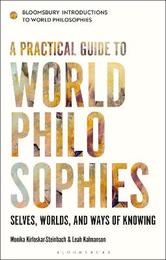
|
A Practical Guide to World Philosophies: Selves, Worlds, and Ways of Knowing
Hardback
Main Details
Description
Traditions throughout the world and across history have tackled fundamental questions about the human condition. This one-of-a-kind guide shows how these different philosophies can be effectively studied together. Monika Kirloskar-Steinbach's and Leah Kalmanson's introduction marks a break from conventional approaches. Instead of assuming philosophy has always operated with a single, easily identifiable conceptual framework across space and time, which we call-and have always called-philosophy, they attest to the plurality of concepts and methods adopted at different times and places. The book serves as a practical teaching guide to the theoretical and methodological diversification of philosophy as practiced in academia today. Complementing the Bloomsbury Introductions to World Philosophies series, it covers a variety of traditions featured in the book series, exploring how Anglo-American, Chinese, Indian, African, Islamicate, and Maori thinkers have all addressed fundamental questions such as: * How do we understand ourselves and our relations to others? * How do we understand our world? * How do we seek knowledge, share knowledge, and, importantly, intervene in the norms of received knowledge when needed? Featuring teaching notes, discussion questions, and a list of further reading, this is a book packed with the background, guidance, and tools required to teach different philosophies. Through it we come to see why making room for different conceptual frameworks improves our understanding of ourselves and the worlds we live in.
Author Biography
Monika Kirloskar-Steinbach is Professor of Philosophy at the University of Konstanz, Germany and Editor-in-Chief of the Journal of World Philosophies. Leah Kalmanson is Associate Professor in the Department of Philosophy and Religion at Drake University, USA.
ReviewsA much-needed reformulation of the methodology used in the discipline that we have traditionally-and perhaps wrongfully-called 'comparative philosophy.' This book is essential for anyone interested in examining world philosophies in their college courses. * James McRae, Professor of Asian Philosophy and Religious Studies, Westminster College (Fulton), USA * A critical, wide-ranging, and supremely useful guide to the study of world philosophies. * Tim Connolly, Professor and Chair of Modern Languages, Philosophy, and Religion, East Stroudsburg University, USA * The self-aggrandizing parochialism of a "Western" Philosophy representing itself as the only truly universal wisdom is more inappropriate than ever in our daily more intimately connected planet. This accessible and illuminating guide to world philosophies will be a great resource for developing a corrective appreciation of the rich multi-dimensionality of global thought. * Charles W. Mills, Distinguished Professor of Philosophy, City University of New York, USA *
|